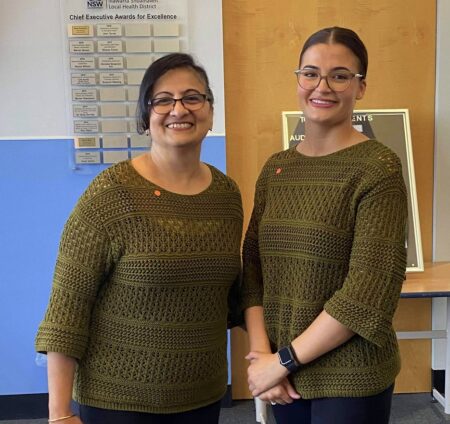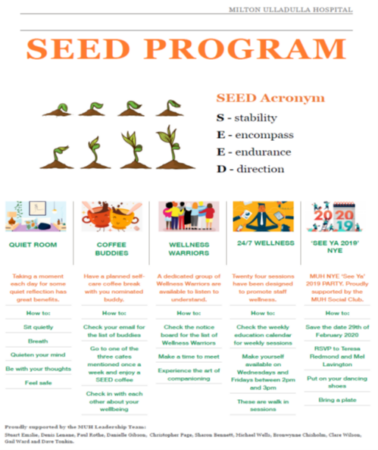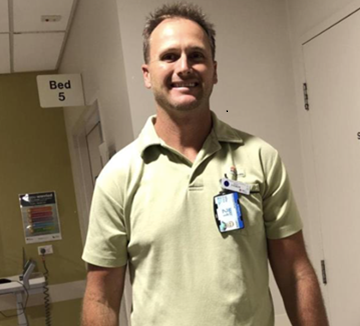Home News & Views Small is all
Small is all

Padmini Pai and Andrea Knezevic
Padmini Pai and Andrea Knezevic
The SEED Program was based in a rural town on the south-east coast of NSW, Australia. SEED provided an opportunity to embed sustainable change for staff wellbeing across the Illawarra Shoalhaven Local Health District (ISLHD), by recognising that staff are the most knowledgeable about their own wellness. Staff in this context is all levels in the hospital, including cleaners, wards persons, allied health, nursing and medical staff. The SEED Program was developed in Milton Ulladulla Hospital (MUH) in the aftermath of the 2019 – 2020 Australian bushfire disaster. A Participatory Action Methodology was used with staff to create the wellbeing program, encompassing five staff led initiatives that promoted healing, wellness, belonging and connection. The name SEED creatively evolved, standing for the true essence of what frontline staff needed at the time: Stability, Encompassing, Endurance and Direction

Padmini Pai and Andrea Knezevic’s Personal Reflection
‘As we let our own light shine, we unconsciously give others permission to do the same’: Marianna Williamson
Each of the 5 elements of nature are powerful in their own way. The element of fire is about transformation. Collectively, we have proven that hardships are a great leveller and wellness is a significant space, where we sit as equals. We have together created a true person-centred workplace.
Three important characteristics of our leadership style have guided us throughout this time: mindfulness, compassion and service. Practicing mindfulness and daily reflection supported us to become more self-aware and focused. Compassion for us is not about being soft, but the ability to understand people at an emotional level, and truly caring about their well-being. Being committed to serving others during this time has helped us provide the space and support for our colleagues to thrive.
SEED for us bridges the gap that exists for staff who feel isolated from the mainstream hubs and services. It has provided us with the opportunity to create a positive social impact within the hospital. Joining the dots and making new connections by inviting leaders from ISLHD to support MUH has also been one of our personal highlights. Significantly, the importance of collective connection is a lesson we will take forward with us.
It’s one thing to want to make changes, it can be quite another to actually follow through and do it. Our inspiration has come from actual leaders leading the way.

‘The future depends on what you do today’: Gandhi
Andrew McCabe’s SEED Story, Andi is one of the Health and Security Assistants
I feel if the SEED Program wasn’t introduced to us in Milton, there is no way in the world we would have been able to take on COVID-19 and change the culture the way we have today. SEED has made me a stronger person and provided me with tools to use in work and out of work on a on a daily basis. This program needs the recognition as it’s certainly the missing link in the ‘Wellbeing’ section in NSW Health.
Michelle Loydell’s C.O.R.E. experience with the SEED Program, as a Wellness Warrior

As a registered nurse I was immediately excited to hear that our local health disctrict was supportive of developing a program at Milton Hospital (MUH) to improve holistic
health. I found the whole idea innovative, and progressive, and I was very keen to be involved.
In keeping with the CORE values of NSW Health: Collaboration, Openness, Respect and Empowerment, the initial process began through consultation with the MUH staff. The staff expressed how they were feeling exhausted, and offered goals that they would collaboratively like to achieve. Themes were identified and our Wellness sessions and coffee buddy system were adopted with great success. Openness was a vital component. The coffee meetings and the wellness sessions created safe places where staff could speak openly and allow their own feelings and vulnerabilities to come to the surface. We were taught by the health professionals provided by NSW Health, the art of companioning others, to listen without judgment or comment or problem solving. In this way we learnt to accept our differences and we expanded our self-awareness, and emotional intelligence. We sat through the discomfort that often comes before recognising our own strengths and weaknesses, and before pushing through to our own personal growth. Respect was demonstrated in the sharing of personal stories, and many of us connected in a way that was fresh and new, as we found comfort in the fact that we were not alone. Many of us had been feeling drained and exhausted, and we realised that together, we could act to change this. Together we are strong! The SEED Program helped me to identify that I was taking on too much emotionally, and helped me to set myself some loving boundaries. My self-care has since improved and I feel healthier and happier in my both my personal life and in my work place. After being chosen as an MUH Wellness Warrior I felt extremely validated, and inspired by the tangible reward I felt, after having my employer invest time and money into my training. I connected strongly with the Program and cannot speak highly enough of its value. The SEED Program itself is a source of empowerment, both individually and collectively.
SEED increased my confidence in my own abilities to demonstrate kindness, to provide comfort and to support the wellness of myself and my colleagues. The SEED Program has benefited MUH by improving our work place culture, we are now better equipped to care for ourselves, our team, and our community as a whole. I can only hope that this Program is carried on to other hospitals within our health district, and maybe one day beyond. I am sincerely grateful to have been a part of this innovative Program, and feel forever supported, and bonded to my fellow Wellness Warriors as we collectively face the COVID-19 pandemic.
The 6 mentoring sessions have helped me centre myself. Each session gave me space to practice self-awareness and reflect on my clinical practice on a deep level. I feel my life has more balance when I am recovering from the fires and now having to face more uncertainty during the COVID-19 pandemic. I cannot thank my workplace and work friends enough.
To support the sustainability and spread of the program, several presentations have been delivered internally, state-wide and internationally. The SEED Program has one publication (Mackay et al., 2021) and has attracted several prestigious grants (National Health and Medical Research Council [NHMRC]). The New South Wales (NSW) Health Agency for Clinical Innovation (ACI) is also supporting a PhD study exploring the connection between supporting the wellbeing of frontline staff (SEED) and the implementation of Patient Reported Measures (PRMs).
Currently the SEED Program has expanded to support frontline workers within largest hospital in ISLHD, including the Intensive Care Unit and Cardio-Respiratory Unit.
Reference
Mackay, M.T., Pai, P., Emslie, S., Knezevic, A. and Mackay, J. (2021) SEED Program: the development of a program that has enabled the learning and growth of staff in the response to a community crisis. Health Education in Practice: Journal of Research for Professional Learning. Vol. 4. No. 1. https://openjournals.library.sydney.edu.au/index.php/HEP/article/view/14691
Comments are closed.

